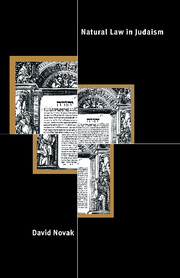7 - Conclusion
Published online by Cambridge University Press: 28 October 2009
Summary
By way of conclusion, I would like to summarize the preceding chapters and suggest some of their main implications for further discussion. This can best be done by presenting ten propositions about natural law in Judaism that have emerged from the previous chapters. Each is followed by some brief elaboration. They are as follows:
1. Natural law is that which lies at the junction of theology and philosophy.
has long been a matter of some debate whether natural law is a theological doctrine or a philosophical idea. Theology is a method devised to understand the basic notions of revelation, which can be called “doctrine” (torah). Philosophy is a method devised to understand basic notions about the world, which can be called “ideas” (eidos). Each version of natural law, the theological or the philosophical, is problematic. Perhaps the best solution possible for these respective problems is to see natural law lying at the junction of theology and philosophy rather than in the court of one or the other exclusively.
natural law is a theological doctrine, then it seems to be basically a form of apologetics. For one of the central doctrines of Judaism, indeed one so central that it has been legally designated a dogma which may not be denied, is that the Torah is the revealed law of God. Aside from whatever ends one might think the various norms of that law intend respectively, the law itself is to be obeyed because God is God.
- Type
- Chapter
- Information
- Natural Law in Judaism , pp. 174 - 193Publisher: Cambridge University PressPrint publication year: 1998



